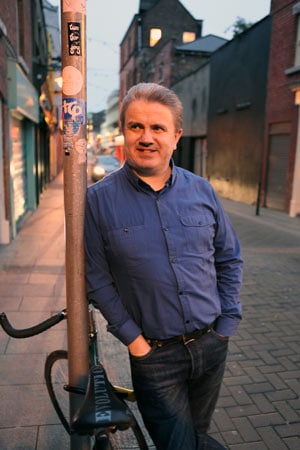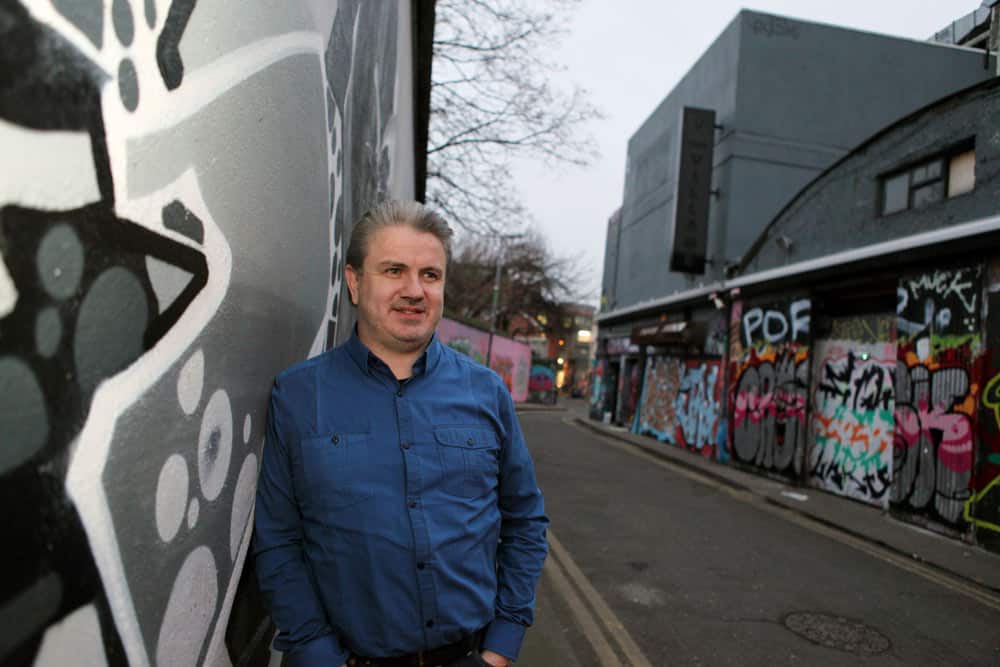Irish radio veteran Simon Maher’s latest incarnation, 8Radio, is seducing audiences across the country. Here, he discusses his path through the Irish music radio landscape with Colin White.
Previously founder, presenter and general manager of Phantom 105.2 – Dublin’s iconic and original alternative radio service – Simon Maher has a better insight than most of the Irish radio scene. From Phantom’s early inception as a pirate station, through to its development into a fully licensed operation, Maher was pivotal in a mini-revolution for Irish broadcasting.
In his own youth, Maher was fascinated by the technology of radio; more of a self-titled technical nerd than a musical aficionado.
He was interested in how radio worked and wanted to discover what was “behind the curtain”. Maher honed his craft with stints volunteering on community radio and on pirate stations, before setting up Coast FM is his back garden, which ran for four years.
The concept for Phantom came about when seven enthusiastic, like-minded ‘presenters’ discovered they shared an interest in alternative rock music. Maher and his cohort spotted an opportunity to launch something unique to the Irish radio market.
A decision was made quite quickly into the pirate version of Phantom to attempt to put the project on a more permanent footing. And, as a result, three applications for an FM licence were made: failed attempts in 1999 and 2001, before eventual success in 2003.
Maher recalls the various applications. “2001 came down to choice between us and a country music station, which won,” he says. “At the time we were devastated, but we believed we had put together a solid business plan. In 2003, we thought we’d give it one last attempt.”
Undoubtedly, the approved proposal in 2003 benefitted from a notable consortium that included Paul McGuinness, Dermot Desmond and Paul Kavanagh, amongst others – a very heavy hitting group that convinced the decision makers of the project’s large-scale potential.
REVENUES
The financial reality of what was required for a radio station to be commercially successful in boom-time Ireland soon became evident for Maher.
“Phantom needed to bring in around €1.8m a year to break even,” he comments. “That was absolutely mad. But at the same time, we knew we need to keep a level of authenticity to the brand.”
“The market was starting to consolidate quite rapidly. Scottish Radio Holdings had bought Today FM, Emap then bought Scottish Radio Holdings, which was in turn sold to Denis O’Brien’s Communicorp. You had more stations, but less players.”
He continues: “And then the internet changed everything for radio. For specialist music radio, it completely changed the game. “
2009 was the year when the full realisation of the financial difficulties kicked in for Maher. He says: “Revenue fell through the floor. We weren’t at break-even. We then started messing around with the product, instead of taking the correct steps to change the business model – we broke what Phantom was.”
Shortly after Communicorp came on board with the station – rebranded to TXFM – Maher was let go. After some time reflecting, he came up with, not just a programming model, but also a sustainable business model.
In 2013, the 8Radio.com Group was formed and a formal structure was born with a philosophy to play a more random selection of high-quality songs. “We just wanted to play good records,” enthuses Maher. “It was a concept of an almost an old-school version of music radio.”
So, what exactly is the 8Radio business model? Maher explains: “It needs to be very simple. If an alternative music service can only bring in €400,000 per year, then we have to build the model around that. Adjusting the service to fit the model is never going to work, because in a world of infinite choice. You have to give people the ‘thing’, and if you compromise that, it will never work.”
I ask about the royalty system in Ireland and how funds are distributed to music makers – musician earnings being a topic that has received its fair share of media attention in recent years.
Maher explains: “In Irish commercial radio, normally you pay a percentage of turnover to the Irish Music Rights Organisation (IMRO) and Phonographic Performance Ireland (PPI). For online radio, it’s on a basis of how many people are streaming. It can turn out quite expensive for small broadcasters, as, essentially, we pay our royalties twice through our FM presence and the online payments system.”
LICENSING
Apart from its online presence, which is 8Radio.com’s main broadcast platform, 8Radio was granted a temporary FM licence to broadcast to the cities of Dublin, Galway, Cork and Limerick during weekends.
A permanent FM licence is still a goal for Maher and 8Radio, but as he explains, isn’t paramount to what constitutes as success for the station.
“The world of radio has truly shifted over the last ten years,” he says. “The office radio has been replaced by employees using headphones, while people at home are listening to internet radio.”
“Ten years ago there was no way we were going to build an audience without it. Now, it would be nice to have an FM licence, but it terms of the permanency and where our audience is, the main benefit of FM for us is targeting car listenership.”
As the 8Radio site eloquently states, ‘These FM broadcasts are intended to act as further proof of concept for the 8Radio.com format and provide an avenue for disenfranchised radio listeners to find their way back to Irish radio.’
When the topic of how Ireland has embraced digital in terms of modern broadcasting, Maher believes our UK counterparts have grasped the concept in way Ireland failed to circa 2005.
“There are more outlets in the UK. When TXFM went bust in October 2016, many of its daily listeners would have gone to Spotify or Deeser, rather than another station. And that’s a problem.”
FUTURE ISLANDS

Simon Maher
Maher strongly believes there is a market for an alternative music service in Ireland; one which operates on a business model that matches its niche appeal, while providing a high-quality valuable outlet for music that would not normally be available on Irish daytime terrestrial radio.
He states: “From an 8Radio perspective, we need to become permanent. If it turns out that permanence means the online world only, then it is what it is and we need to work our way around the revenue potentials.”
“In terms on industry itself, there will always be a market for linear radio – for instance, talk radio it is as healthy as ever – but more specialised elements could struggle. If we don’t decide now that there’s a value to a more specialised music service – in our example, alternative rock music – it will go.”
“There’s massive potential in something with a sprinkling of Irishness, not just in terms of music, but encompassing the whole cultural side of things too. It’s something different to a Spotify playlist, and there’s definitely a commercial value to listeners actively listening to something Irish.”
Maher is also acutely aware of the abundance of choice for the modern music fan.
“We have to accept that people are going to listen to various stations and we know that we are part of a basket of options available. It’s okay to be a station that someone likes, without them having a particular loyalty to us. The marketing challenge for us is to grab as much of the available listenership as possible,” concludes Maher.







